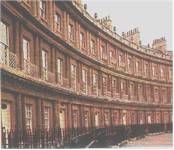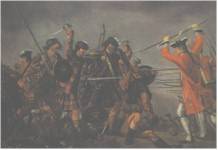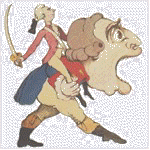 |
There were a lot of better qualified
people available to be king of England - unfortunately
most of them were Catholic. George I was a German who did
not speak a word of English, but was Protestant. So
started the rule of the House of Hanover, under whom
Britain achieved wealth and peace over the next century |
 |
| George was immediately challenged by James II's son,
James the Old Pretender, landing in Scotland in an
abortive attempt to seize the throne. James soon fled
back into exile in France |
 |
With foreign kings. parliament became more powerful,
and the leading politician was Walpole (right) who was
prime minister until 1742. He avoided the expense of war,
and Britain prospered |
 |
In 1745 the exiled Stuarts led by James II's
grandson, Bonnie Prince Charlie.His Highland army got as
far south as Derby, but a poor supply line and English
reinforcements forced them to retreat. A retreat that
ended with the final defeat at Culloden |
 |
| |
|
|
 |
The coming of George III (right) to the throne in
1760, brought the first British born king for 50 years.
And a king who was to reign for the next 50 years. They
were exciting times, marred only by the loss of the
American Colonies. |
 |
| |
|
|
 |
A canal network was built (left). Captain
Cook explored the Pacific (right). Robert Adams was the
architect to commission, John Wilkes won liberties for
the people, Josiah Wedgwood made china, Gainsborough and
Stubbs paints, Capability Brown designed gardens |
|
| |
|
|
| Britain won new territories in Canada and India,
but lost the oldest settlement of all, with the declaration of independence
by the American colonies in 1776 and the final surrender at Yorktown (right)
in 1781 |

|
The loss of the American colonies brought about
changes in Britain with the appointment of Pitt the Younger as prime minister,
whose legislative programme was to bring about the end of royal power. |
| |
|
|
 |
At home the industrial revolution was in full swing.
Coal fires (right) lit the night sky as they powered
steam engines in factories. But in Europe, French power
was manifesting itself following the French revolution in
1789. Nelsons's victory at Trafalgar ensured the Britain
ruled the seas, but French troops controlled Europe. A
major war loomed |
 |
| |
|
|












